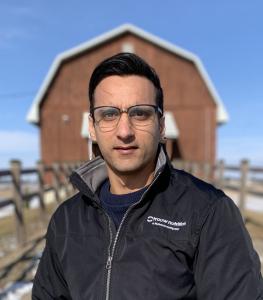 |
Sudhanshu SudanPosition/Title: Post-doctoral Scholar email: ssudan@uoguelph.ca Phone: Office:
|
I am a PhD student in Dr. Julang Li's Lab and currently involved in developing startegies in combating weaning stress in pigs via novel probiotic applications. I graduated from Faculty of Agriculture, Dalhousie University Nova Scotia with a MSc degree in 2013. Over the years I have been involved in interdisciplinary research areas including cell biology, toxicology and cancer bioloigy. Working for Trouw Nutrition as their R&D lab lead technologist for the past five years, I have gained an entire new set of research and managemnent skills while imprioving upon the existing ones.
Currently, the focus of my research is to select and assess role of beneficial microbes isolated from novel niche in gut health and function, stress response and microbiome modulation in piglets. There is an increasing appreciation that the gut microbiota greatly influences the health of their eukaryotic hosts by conferring enhanced metabolic, immunological, antimicrobial and behavioral benefits. However, during weaning these microbial populations and their in-host functions can be severely disrupted, rendering the host suspectable to pathogenic infections and resulting in post-weaning diarrhea, decreased gut function, growth and increased mortality. Due to the critical nature of weaning stage, introduction of beneficial bacterial populations can help attenuate weaning-induced impairment of the gut health and function resulting in enhanced growth and overall performance of piglets. Host-microbe interaction studies suggest gut microbiome helps the hosts to evolve and adjust to their specific environment. Therefore, the assumption is that in extreme environments (with extreme temperatures and limited food), gut microbiota of the healthy animals may possess high metabolic/enzyme and anti-pathogenic properties to help their hosts survive in those conditions. In my research, I am trying to exploit this evolutionary benefit of the selective pressure on these microbes by specifically screening and selecting beneficial and novel commensals from selective extreme environments and analysing their metabolic activity, immunity against gut pathogens and gut health compared to commercially available animal probiotic products. One of the key establishments I have done for this work is to establish an in vitro intestinal pathogen (E.coli, Salmonella, Clostridium and MRSA) challenge/infection model, where responses related to infection, immunity, cell barrier integrity and metabolic changes can be observed and quantified. This approach has a high industrial relevance as it can be used for a variety of potential antimicrobial compounds or feed additives for similar assessments, before in vivo application.
